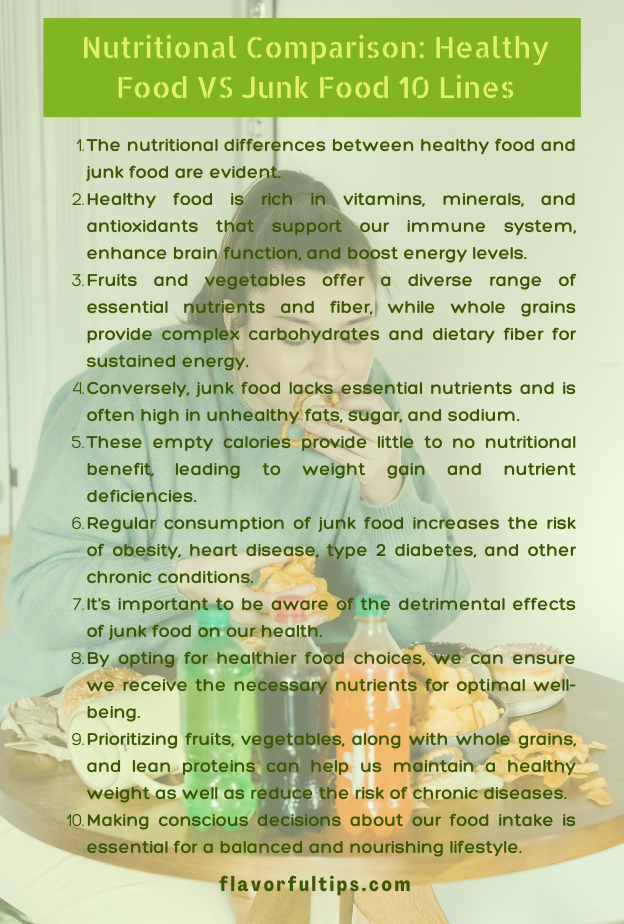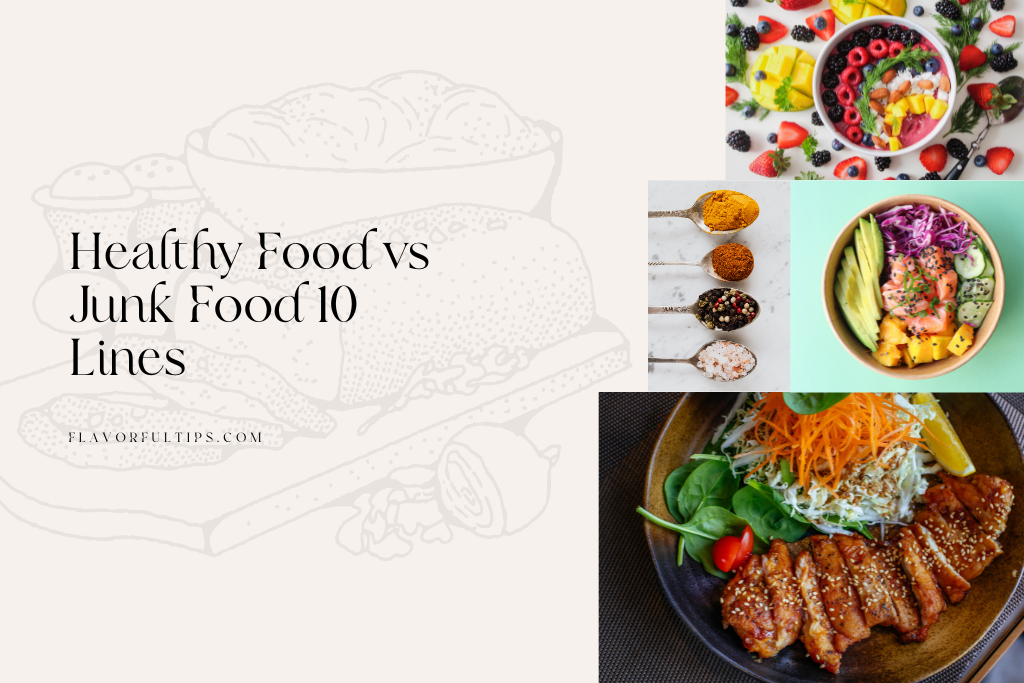In today’s fast-paced world, our food choices play a significant role in determining our overall well-being. The battle between healthy food and junk food has become a prevalent topic of discussion. With tempting advertisements and readily available options, it’s essential to understand the impact of our dietary choices. This blog (on healthy food vs junk food 10 lines) aims to shed light on the stark differences between healthy food and junk food, empowering you to make informed decisions about what you consume.
Definition of Healthy Food
Healthy food refers to nutrient-dense, minimally processed foods that provide essential vitamins, minerals, and other nutrients required for optimal health. These include fresh fruits and vegetables, also whole grains, lean proteins, as well as healthy fats. Incorporating a variety of these foods into our diet ensures a balanced intake of macronutrients and micronutrients, promoting overall well-being.
Definition of Junk Food
On the other hand (of Healthy Food vs Junk Food 10 Lines), junk food typically refers to highly processed and calorie-dense foods that are low in nutritional value. These foods are often high in unhealthy fats, sugar, sodium, and artificial additives. Common examples include fast food items, sugary snacks, sodas, and fried foods. While they may satisfy our taste buds temporarily, excessive consumption of junk food can lead to various health issues.
Nutritional Comparison: Healthy Food VS Junk Food 10 Lines

- The nutritional differences between healthy food and junk food are evident.
- Healthy food is rich in vitamins, minerals, and antioxidants that support our immune system, enhance brain function, and boost energy levels.
- Fruits and vegetables offer a diverse range of essential nutrients and fiber, while whole grains provide complex carbohydrates and dietary fiber for sustained energy.
- Conversely, junk food lacks essential nutrients and is often high in unhealthy fats, sugar, and sodium.
- These empty calories provide little to no nutritional benefit, leading to weight gain and nutrient deficiencies.
- Regular consumption of junk food increases the risk of obesity, heart disease, type 2 diabetes, and other chronic conditions.
- It’s important to be aware of the detrimental effects of junk food on our health.
- By opting for healthier food choices, we can ensure we receive the necessary nutrients for optimal well-being.
- Prioritizing fruits, vegetables, along with whole grains, and lean proteins can help us maintain a healthy weight as well as reduce the risk of chronic diseases.
- Making conscious decisions about our food intake is essential for a balanced and nourishing lifestyle.
| Also Check: Get more such blogs here. |
Health Consequences: Healthy Food VS Junk Food 10 Lines
The consequences of regularly consuming junk food extend far beyond temporary satisfaction. Studies have linked the excessive intake of junk food to a range of health issues. The high levels of unhealthy fats and added sugars contribute to weight gain and obesity, putting individuals at risk of developing metabolic syndrome. The excess sugar in junk food can lead to insulin resistance, promoting the onset of type 2 diabetes.
Moreover, the high sodium content in many junk food items can elevate blood pressure, increasing the risk of cardiovascular diseases. The lack of fiber and essential nutrients in junk food also weakens the immune system, making individuals more susceptible to infections and illnesses.
Benefits of Healthy Food
This is another point to consider while learning about Healthy Food VS Junk Food 10 Lines. Choosing healthy food over junk food brings numerous benefits to our overall well-being. A diet rich in fruits, vegetables, whole grains, lean proteins, and healthy fats helps maintain a healthy weight, reduces the risk of chronic diseases, and promotes longevity.
The abundance of vitamins, minerals, and antioxidants in these foods strengthens the immune system, enhances cognitive function, and supports a healthy digestive system.
Incorporating healthy food into our diet also boosts energy levels, enabling us to perform better physically and mentally. Moreover, the fiber content in whole grains and vegetables aids digestion, promotes satiety, and supports healthy weight management.
Strategies for Making Healthier Choices
Transitioning to a healthier diet doesn’t have to be overwhelming. Here are some practical strategies to help you make healthier choices:
Plan your meals
Create a weekly meal plan that includes a variety of healthy foods.
Cook at home
Prepare meals from scratch to have better control over ingredients and portion sizes.
Shop smart
Fill your cart with fresh produce, whole grains, lean proteins, and healthy fats.
Opt for healthy snacks
Keep a stock of nutritious snacks like fruits, nuts, and yogurt to curb unhealthy cravings.
Stay hydrated
Drink plenty of water throughout the day to stay hydrated and avoid mistaking thirst for hunger.
Mindful eating
Pay attention to your hunger and fullness cues, eating slowly and savoring each bite.
Try new recipes
Experiment with different healthy recipes to keep your meals exciting and flavorful.
Incorporate small changes
Gradually replace unhealthy ingredients with healthier alternatives in your favorite dishes.
Seek support
Engage with friends or family members who share your goal of adopting a healthier lifestyle.
Practice moderation
Allow yourself occasional indulgences while ensuring they are balanced with a predominantly healthy diet.
Overcoming Challenges
Transitioning to a healthier diet may present challenges, but with determination, they can be overcome. Lack of time, cravings for unhealthy foods, and social pressures are common hurdles.
To combat these challenges, plan your meals in advance, have healthy snacks readily available, and communicate your dietary choices with friends and family. Remember, small steps toward a healthier diet can lead to significant improvements in your overall well-being.
The Role of Moderation
While it’s crucial to prioritize healthy food, it’s equally important to acknowledge the role of moderation. Completely depriving yourself of your favorite treats may lead to feelings of restriction and frustration. Instead, enjoy occasional indulgences while maintaining a predominantly healthy diet.
By practicing moderation, you can strike a balance that allows you to savor the pleasures of life while taking care of your health.
Conclusion
The choices we make regarding our diet have a profound impact on our well-being. By understanding the differences between healthy food and junk food by (Healthy Food VS Junk Food 10 Lines), we can make informed decisions that positively influence our health.
Embrace the benefits of consuming nutrient-dense foods, and adopt practical strategies to incorporate them into your daily life. Remember, by prioritizing your health and making conscious choices, you can achieve a balanced and vibrant lifestyle.



